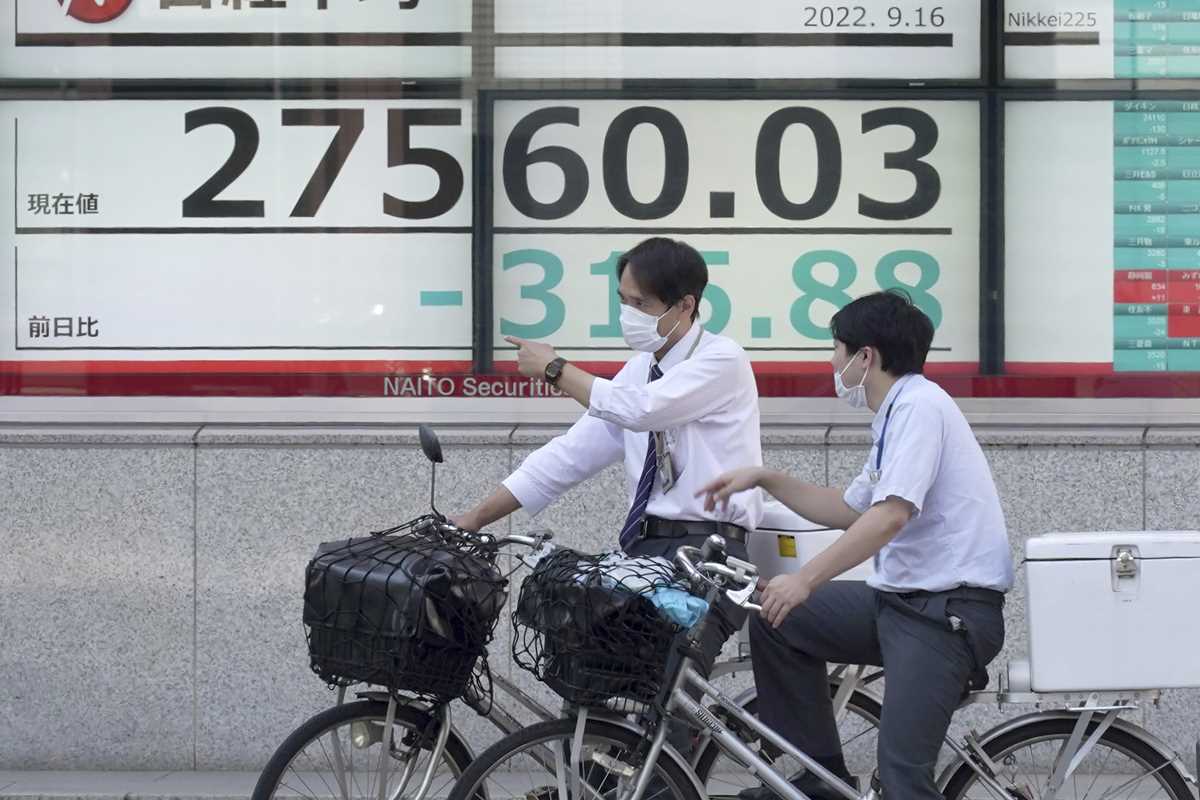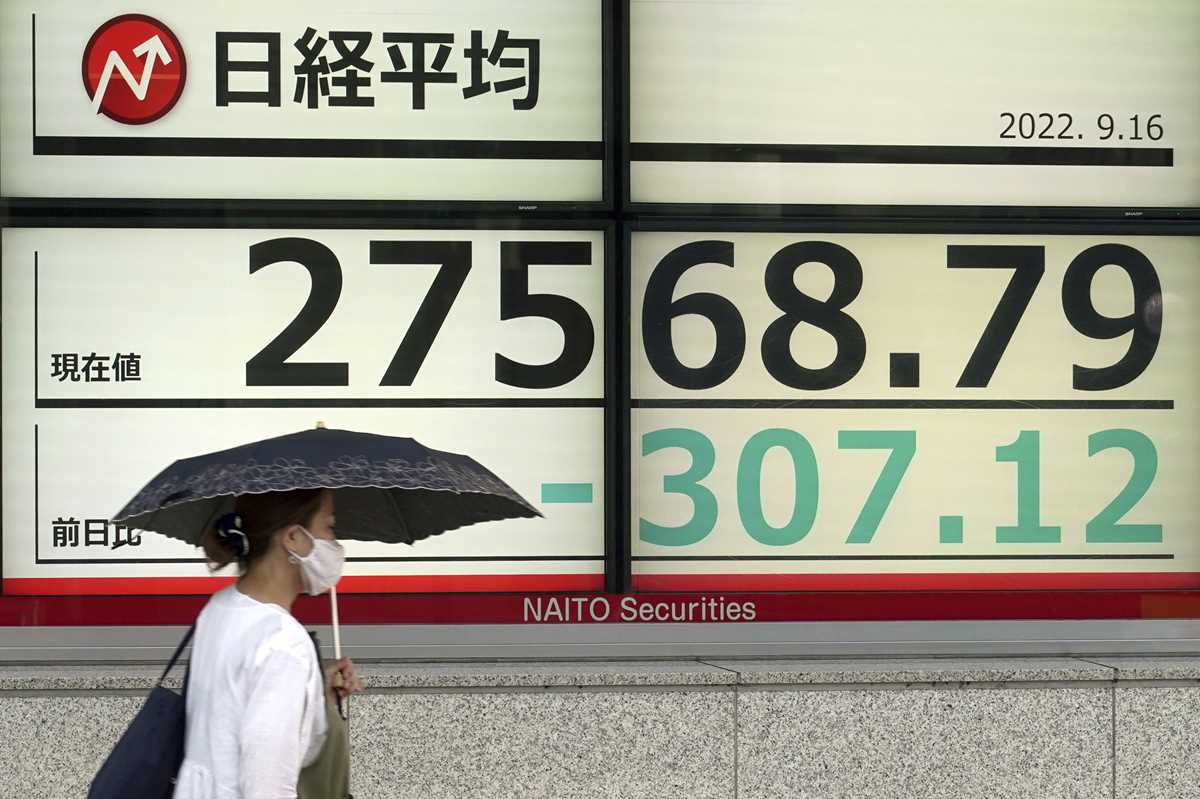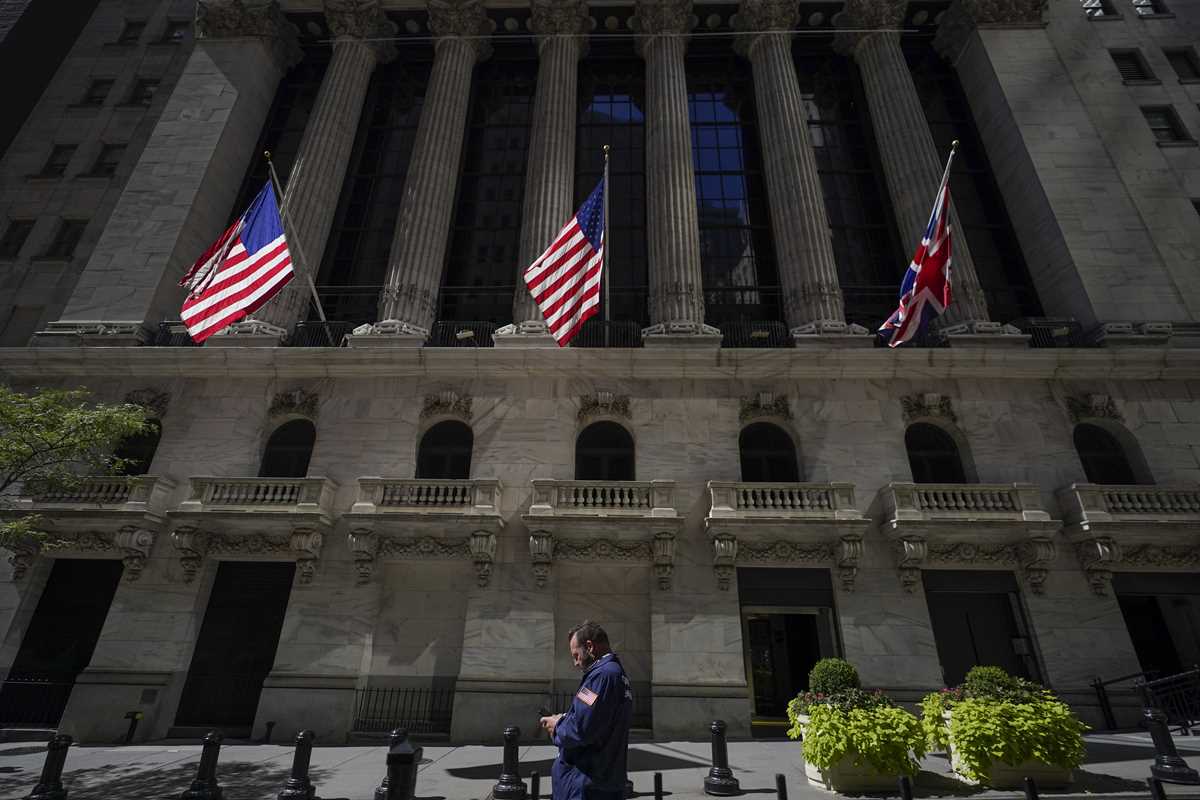 Traders work on the floor of the New York Stock Exchange on Tuesday, Sept. 13, 2022. The stock market fell the most since June 2020, with the Dow loosing more than 1,250 points. (AP Photo/Julia Nikhinson)
Traders work on the floor of the New York Stock Exchange on Tuesday, Sept. 13, 2022. The stock market fell the most since June 2020, with the Dow loosing more than 1,250 points. (AP Photo/Julia Nikhinson) A currency trader watches computer monitors near the screens showing the Korea Composite Stock Price Index (KOSPI), left, and the foreign exchange rate between U.S. dollar and South Korean won at a foreign exchange dealing room in Seoul, South Korea, Thursday, Sept. 15, 2022. Shares were mostly higher in Asia on Thursday after a wobbly day of trading yielded modest gains on Wall Street. (AP Photo/Ahn Young-joon)
A currency trader watches computer monitors near the screens showing the Korea Composite Stock Price Index (KOSPI), left, and the foreign exchange rate between U.S. dollar and South Korean won at a foreign exchange dealing room in Seoul, South Korea, Thursday, Sept. 15, 2022. Shares were mostly higher in Asia on Thursday after a wobbly day of trading yielded modest gains on Wall Street. (AP Photo/Ahn Young-joon) A currency trader watches computer monitors near the screens at a foreign exchange dealing room in Seoul, South Korea, Thursday, Sept. 15, 2022. Shares were mostly higher in Asia on Thursday after a wobbly day of trading yielded modest gains on Wall Street. (AP Photo/Ahn Young-joon)
A currency trader watches computer monitors near the screens at a foreign exchange dealing room in Seoul, South Korea, Thursday, Sept. 15, 2022. Shares were mostly higher in Asia on Thursday after a wobbly day of trading yielded modest gains on Wall Street. (AP Photo/Ahn Young-joon) A currency trader watches computer monitors near the screens showing the foreign exchange rates at a foreign exchange dealing room in Seoul, South Korea, Thursday, Sept. 15, 2022. Shares were mostly higher in Asia on Thursday after a wobbly day of trading yielded modest gains on Wall Street. (AP Photo/Ahn Young-joon)
A currency trader watches computer monitors near the screens showing the foreign exchange rates at a foreign exchange dealing room in Seoul, South Korea, Thursday, Sept. 15, 2022. Shares were mostly higher in Asia on Thursday after a wobbly day of trading yielded modest gains on Wall Street. (AP Photo/Ahn Young-joon) Currency traders watch computer monitors near the screens showing the Korea Composite Stock Price Index (KOSPI), left, and the foreign exchange rate between U.S. dollar and South Korean won at a foreign exchange dealing room in Seoul, South Korea, Thursday, Sept. 15, 2022. Shares were mostly higher in Asia on Thursday after a wobbly day of trading yielded modest gains on Wall Street. (AP Photo/Ahn Young-joon)
Currency traders watch computer monitors near the screens showing the Korea Composite Stock Price Index (KOSPI), left, and the foreign exchange rate between U.S. dollar and South Korean won at a foreign exchange dealing room in Seoul, South Korea, Thursday, Sept. 15, 2022. Shares were mostly higher in Asia on Thursday after a wobbly day of trading yielded modest gains on Wall Street. (AP Photo/Ahn Young-joon) A trader looks over his cell phone outside the New York Stock Exchange, Wednesday, Sept. 14, 2022, in the financial district of Manhattan in New York. Stocks edged higher in afternoon trading on Wall Street Wednesday following the market's worst day in two years on fears about higher interest rates and the recession they could create. (AP Photo/Mary Altaffer)
A trader looks over his cell phone outside the New York Stock Exchange, Wednesday, Sept. 14, 2022, in the financial district of Manhattan in New York. Stocks edged higher in afternoon trading on Wall Street Wednesday following the market's worst day in two years on fears about higher interest rates and the recession they could create. (AP Photo/Mary Altaffer) Security personnel stand guard outside the New York Stock Exchange, Wednesday, Sept. 14, 2022, in the financial district of Manhattan in New York. Stocks edged higher in afternoon trading on Wall Street Wednesday following the market's worst day in two years on fears about higher interest rates and the recession they could create. (AP Photo/Mary Altaffer)
Security personnel stand guard outside the New York Stock Exchange, Wednesday, Sept. 14, 2022, in the financial district of Manhattan in New York. Stocks edged higher in afternoon trading on Wall Street Wednesday following the market's worst day in two years on fears about higher interest rates and the recession they could create. (AP Photo/Mary Altaffer) A person wearing a protective mask walks in front of an electronic stock board showing Japan's Nikkei 225 index at a securities firm Friday, Sept. 16, 2022, in Tokyo. Asian stock markets followed Wall Street lower on Friday after higher-than-expected U.S. inflation dashed hopes the Federal Reserve might ease off more interest rate hikes. (AP Photo/Eugene Hoshiko)
A person wearing a protective mask walks in front of an electronic stock board showing Japan's Nikkei 225 index at a securities firm Friday, Sept. 16, 2022, in Tokyo. Asian stock markets followed Wall Street lower on Friday after higher-than-expected U.S. inflation dashed hopes the Federal Reserve might ease off more interest rate hikes. (AP Photo/Eugene Hoshiko) People look at an electronic stock board showing Japan's Nikkei 225 index in Tokyo Friday, Sept. 16, 2022. Asian stock markets followed Wall Street lower on Friday after higher-than-expected U.S. inflation dashed hopes the Federal Reserve might ease off more interest rate hikes. (AP Photo/Eugene Hoshiko)
People look at an electronic stock board showing Japan's Nikkei 225 index in Tokyo Friday, Sept. 16, 2022. Asian stock markets followed Wall Street lower on Friday after higher-than-expected U.S. inflation dashed hopes the Federal Reserve might ease off more interest rate hikes. (AP Photo/Eugene Hoshiko) People wearing protective masks ride bicycles in front of an electronic stock board showing Japan's Nikkei 225 index at a securities firm Friday, Sept. 16, 2022, in Tokyo. Asian stock markets followed Wall Street lower on Friday after higher-than-expected U.S. inflation dashed hopes the Federal Reserve might ease off more interest rate hikes. (AP Photo/Eugene Hoshiko)
People wearing protective masks ride bicycles in front of an electronic stock board showing Japan's Nikkei 225 index at a securities firm Friday, Sept. 16, 2022, in Tokyo. Asian stock markets followed Wall Street lower on Friday after higher-than-expected U.S. inflation dashed hopes the Federal Reserve might ease off more interest rate hikes. (AP Photo/Eugene Hoshiko) A person wearing a protective mask walks in front of an electronic stock board showing Japan's Nikkei 225 index at a securities firm Friday, Sept. 16, 2022, in Tokyo. Asian stock markets followed Wall Street lower on Friday after higher-than-expected U.S. inflation dashed hopes the Federal Reserve might ease off more interest rate hikes. (AP Photo/Eugene Hoshiko)
A person wearing a protective mask walks in front of an electronic stock board showing Japan's Nikkei 225 index at a securities firm Friday, Sept. 16, 2022, in Tokyo. Asian stock markets followed Wall Street lower on Friday after higher-than-expected U.S. inflation dashed hopes the Federal Reserve might ease off more interest rate hikes. (AP Photo/Eugene Hoshiko) A person wearing a protective mask stands in front of an electronic stock board showing Japan's Nikkei 225 index at a securities firm as a vehicle goes by Friday, Sept. 16, 2022, in Tokyo. Asian stock markets followed Wall Street lower on Friday after higher-than-expected U.S. inflation dashed hopes the Federal Reserve might ease off more interest rate hikes. (AP Photo/Eugene Hoshiko)
A person wearing a protective mask stands in front of an electronic stock board showing Japan's Nikkei 225 index at a securities firm as a vehicle goes by Friday, Sept. 16, 2022, in Tokyo. Asian stock markets followed Wall Street lower on Friday after higher-than-expected U.S. inflation dashed hopes the Federal Reserve might ease off more interest rate hikes. (AP Photo/Eugene Hoshiko)BEIJING (AP) — Asian stock markets followed Wall Street lower on Friday after higher-than-expected U.S. inflation dashed hopes the Federal Reserve might ease away from more interest rate hikes.
Shanghai, Tokyo, Hong Kong and Sydney declined. Oil edged higher.
Wall Street's benchmark S&P 500 index lost 1.1% on Thursday, adding to declines since this week's release of government data showing August inflation stayed near a four-decade high despite four interest rate hikes this year to slow the economy.
On Thursday, U.S. government data showed unemployment claims last week declined while August consumer sales rose. That gives ammunition to Federal Reserve officials who say the economy can tolerate more rate hikes.
Wall Street's decline indicates “no sign of relief for risk sentiments” while the job market data “provided the go-ahead for further tightening” in monetary policy, Yeap Jun Rong of IG said in a report.
The Shanghai Composite index lost 1% to 3,166.77 after official data showed Chinese consumer and factory activity improved in August but still were weak. Housing sales fell 30% from a year earlier under pressure from a government crackdown on debt.
The Nikkei 225 in Tokyo sank 1.1% to 27,581.36 and the Hang Seng in Hong Kong retreated 0.5% to 18,829.43.
The Kospi in Seoul shed 1% to 2,377.69 and Sydney's S&P-ASX 200 was 1.5% lower at 6,742.90.
India's Sensex opened down 1% at 59,311.07. New Zealand and Southeast Asian markets declined.
On Wall Street, the S&P 500 declined to 3,901.35 on Thursday after the Labor Department said the number of applications for unemployment benefits last week fell to a four-month low.
The market benchmark is down 4.1% for the week following the biggest pullback in two years on Tuesday after the government reported U.S. consumer prices rose 8.3% from a year earlier and 0.1% compared with July.
The overall figure was down from June's 9.1% peak, but core inflation, which strips out volatile food and energy prices to give a clearer picture of the trend, rose to 0.6% over the previous month, up from July's 0.3% increase.
Traders worry aggressive interest rate hikes by the Federal Reserve and central banks in Europe and Asia to control price rises might derail global economic growth. Two of the Fed's rate hikes this year have been by 0.75 percentage points, triple its usual margin, and traders expect a similar increase this month.
Fed chair Jerome Powell said in August that rates would stay elevated for some time until the U.S. central bank is sure inflation is under control.
The Dow Jones Industrial Average fell 0.6% to 30,961.82. The Nasdaq slid 1.4% to 11,552.36.
Retail sales data gave a mixed view of how American consumers are coping with inflation.
Sales rose by an unexpectedly strong 0.3% in August after falling 0.4% in July.
Railroad operators mostly edged higher after a tentative labor agreement was reached, averting a disruptive strike. Union Pacific rose 0.2% and Norfolk Southern gained 0.3%. CSX fell 3.4%.
In energy markets, benchmark U.S. crude rose 24 cents to $85.34 per barrel in electronic trading on the New York Mercantile Exchange. The contract fell $3.38 on Thursday to $85.10. Brent crude, the price basis for international oil trading, gained 38 cents to $91.22 23 per barrel in London. It lost $3.26 the previous session to $90.84.
The dollar declined to 143.33 yen from Thursday's 143.49 yen. The euro edged down to 99.90 cents from 99.91 cents.
Before you consider Union Pacific, you'll want to hear this.
MarketBeat keeps track of Wall Street's top-rated and best performing research analysts and the stocks they recommend to their clients on a daily basis. MarketBeat has identified the five stocks that top analysts are quietly whispering to their clients to buy now before the broader market catches on... and Union Pacific wasn't on the list.
While Union Pacific currently has a "Moderate Buy" rating among analysts, top-rated analysts believe these five stocks are better buys.
View The Five Stocks Here
Click the link below and we'll send you MarketBeat's guide to investing in electric vehicle technologies (EV) and which EV stocks show the most promise.
Get This Free Report